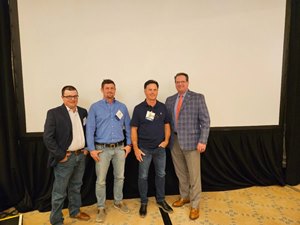HBPA Conference: Three Trainers Express HISA Concerns


The 2023 National Horsemen's Benevolent and Protective Association annual conference closed with a discussion by three prominent horsemen who questioned the need and validity of federal legislation that established the Horseracing Integrity and Safety Authority, especially at a time when the industry faces a challenging economic and logistical future.
Bret Calhoun, Ron Faucheux, and Jason Barkley participated in the Trainer's Talk panel moderated by multiple Eclipse Award-winning journalist and HBPA publicist Jennie Rees. They talked about HISA, challenges facing small- to mid-sized stables, and finding and keeping qualified labor.
HISA dominated the discussion—as it did much of the conference this week at The Hotel Monteleone in New Orleans—and the trio pulled no punches regarding their views of the entity. The HBPA has been involved in litigation opposed to HISA.
"The whole thing is a façade. It's been all smoke and mirrors," said Calhoun, a member of the Louisiana HBPA board who also maintains strings in Kentucky and Texas. "They sold this thing as the safety of the horse. It's absolutely not about safety of horses. It's a few people, with self-interests, and they have their own personal agenda.

"If it was all about the horse we'd be spending a lot more time on racing surfaces. We could probably cure about 50% to 75% of the injuries if we had somebody overseeing surfaces on a daily, weekly basis. Not somebody taking soil samples before the meet and at the end of the meet and calling it good.
"They've been taking away certain medications, therapy machines, things that are truly beneficial. They're having the opposite effect of what they're saying... safety of the horse and rider. They're doing absolutely the opposite. Like I said, it's all a façade."
Faucheux, also a member of the Louisiana HBPA board and, through March 9, just two back of the leader on the Fair Grounds Race Course & Slots' leading trainer's list that he topped for the 2021-2022 meeting, conditions a stable of about 60 horses and has not left his native state since HISA rules went into effect last summer.
Due to a court ruling, West Virginia and Louisiana are exempt from HISA regulations and enforcement.
"I haven't signed up, and I won't sign up. I'll get out of training if I have to sign up," Faucheux said. "A stable like mine, 55-, 60-horse stable, I couldn't afford the cost of having to hire somebody to do the paperwork for me. The added expenses of it all, it wouldn't work financially for me. It's a struggle to get by the last couple years. Feed costs have gone up 50%, hay, shavings, it doesn't make financial sense for a trainer in Louisiana year-round to sign up and have to take on all those added fees because right now we're barely making it as it is."
Barkley maintains a stable of about 30 horses based at Fair Grounds and Oaklawn Park in the winter and in Kentucky most of the year. A member of the Kentucky HBPA board and a third-generation horseman, Barkley said he feels the impact of the regulations already and only sees them as potential obstacles for trainers hoping to grow their stables.
"A lot of my smaller clients they don't want to pay the added cost of a per-start fee, the extra vet checks, and all the added fees they want to put on us," Barkley said. "There's added costs and the time to do all the work.
"Between me and my main assistant, who is my wife, Shelbi, we do the extra paperwork, keeping track of everything. We already kept track of what every horse got every day, but to then have to put it into files, that doubles the workload. That is time taken away from actually working with your horses, which is what you should really be focused on."
The trainers also agreed on another major challenge they face—finding and keeping good help. That situation was difficult well before the pandemic and has been exacerbated since.
"I've got a family of, like, 15 that work for me," Barkley said, joking that his 2-year-old daughter was back at the barn mixing feed while he attended the panel. "A lot of it is that you get good people that know good people, and hopefully keep pulling them in that way."
Calhoun called it an "impossible task" he and his colleagues face nationwide.
"Since COVID, there's now a reduced number of employees that you can find," Calhoun said. "That's part of the issue. Then you add HISA costs to this, and our labor costs are through the roof. It's the highest bidder, and eventually, you're losing significant money to stay in business."
